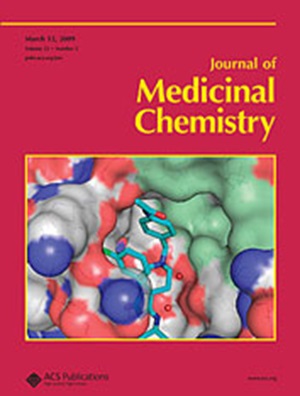Discovery of Novel SHP2 ATTEC Degraders against Pancreatic Ductal Adenocarcinoma Harboring KRAS(G12D) Mutations
IF 6.8
1区 医学
Q1 CHEMISTRY, MEDICINAL
引用次数: 0
Abstract
Aberrant expression of the phosphatase SHP2 is implicated in numerous cancers, including KRAS G12D mutation driven PDAC. Although several SHP2 inhibitors have been reported, specific inhibitors with potent efficacy are not yet available. Given the elevated autophagy in PDAC, herein, we first designed novel SHP2 degraders through autophagosome-tethering compound strategy. Among them, the preferred 11n formed hydrogen bonds with Arg 111 and Glu 250 residues of SHP2 to enhance interactions between SHP2 and LC3. 11n also possessed great efficacy and selectivity against KRAS G12D mutant cancer cells versus the wild type. Moreover, the degradation caused by 11n manipulated the signaling pathways associated with cell apoptosis, metastasis, and invasion to inhibit the tumor growth both in vitro and in vivo. These findings not only generated a useful tool for exploring the potential of targeting SHP2 degradation but also offered promising candidates to develop novel drugs based on the autophagy mechanism.

发现抗携带 KRAS(G12D) 突变的胰腺导管腺癌的新型 SHP2 ATTEC 降解剂
许多癌症都与磷酸酶 SHP2 的异常表达有关,包括 KRAS G12D 突变驱动的 PDAC。虽然已有多种 SHP2 抑制剂的报道,但目前还没有具有强效的特异性抑制剂。鉴于 PDAC 中自噬作用的增强,我们首先通过自噬体拴系化合物策略设计了新型 SHP2 降解剂。其中,优选的 11n 与 SHP2 的 Arg 111 和 Glu 250 残基形成氢键,增强了 SHP2 与 LC3 的相互作用。与野生型相比,11n 对 KRAS G12D 突变癌细胞也有很好的疗效和选择性。此外,11n引起的降解还能操纵与细胞凋亡、转移和侵袭相关的信号通路,从而抑制肿瘤在体外和体内的生长。这些发现不仅为探索靶向SHP2降解的潜力提供了有用的工具,还为基于自噬机制开发新型药物提供了有希望的候选者。
本文章由计算机程序翻译,如有差异,请以英文原文为准。
求助全文
约1分钟内获得全文
求助全文
来源期刊

Journal of Medicinal Chemistry
医学-医药化学
CiteScore
4.00
自引率
11.00%
发文量
804
审稿时长
1.9 months
期刊介绍:
The Journal of Medicinal Chemistry is a prestigious biweekly peer-reviewed publication that focuses on the multifaceted field of medicinal chemistry. Since its inception in 1959 as the Journal of Medicinal and Pharmaceutical Chemistry, it has evolved to become a cornerstone in the dissemination of research findings related to the design, synthesis, and development of therapeutic agents.
The Journal of Medicinal Chemistry is recognized for its significant impact in the scientific community, as evidenced by its 2022 impact factor of 7.3. This metric reflects the journal's influence and the importance of its content in shaping the future of drug discovery and development. The journal serves as a vital resource for chemists, pharmacologists, and other researchers interested in the molecular mechanisms of drug action and the optimization of therapeutic compounds.
 求助内容:
求助内容: 应助结果提醒方式:
应助结果提醒方式:


